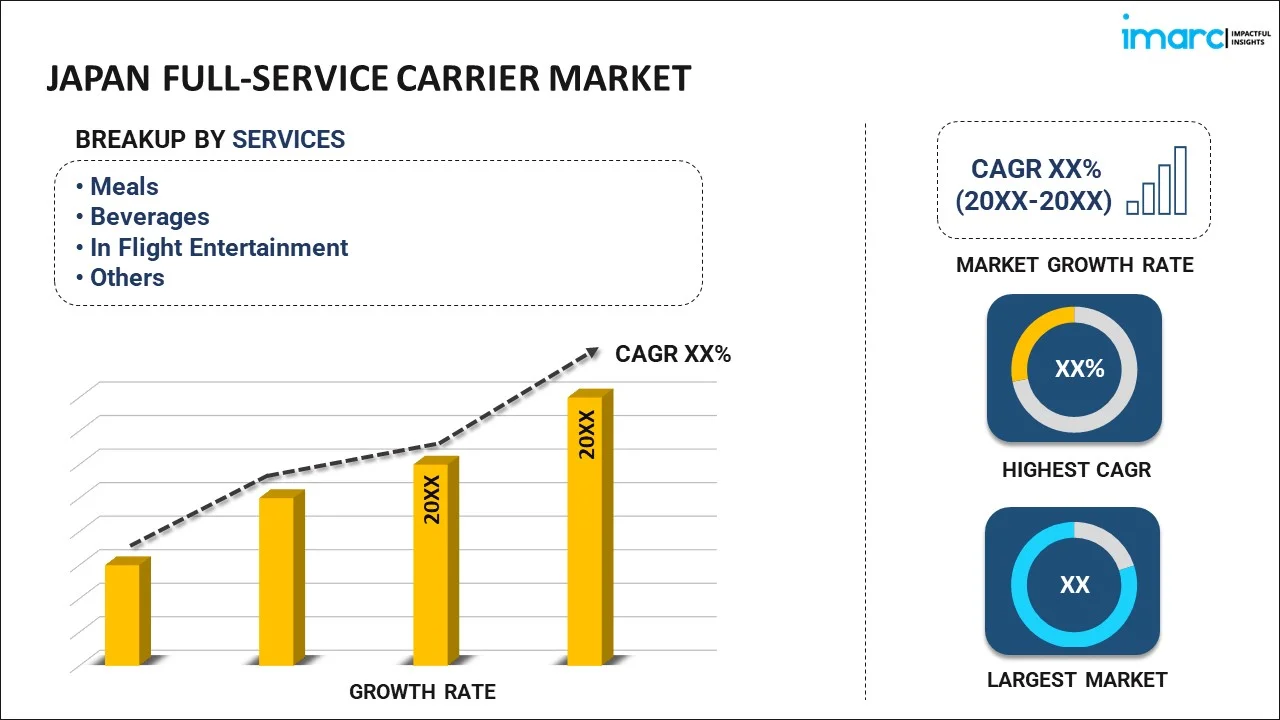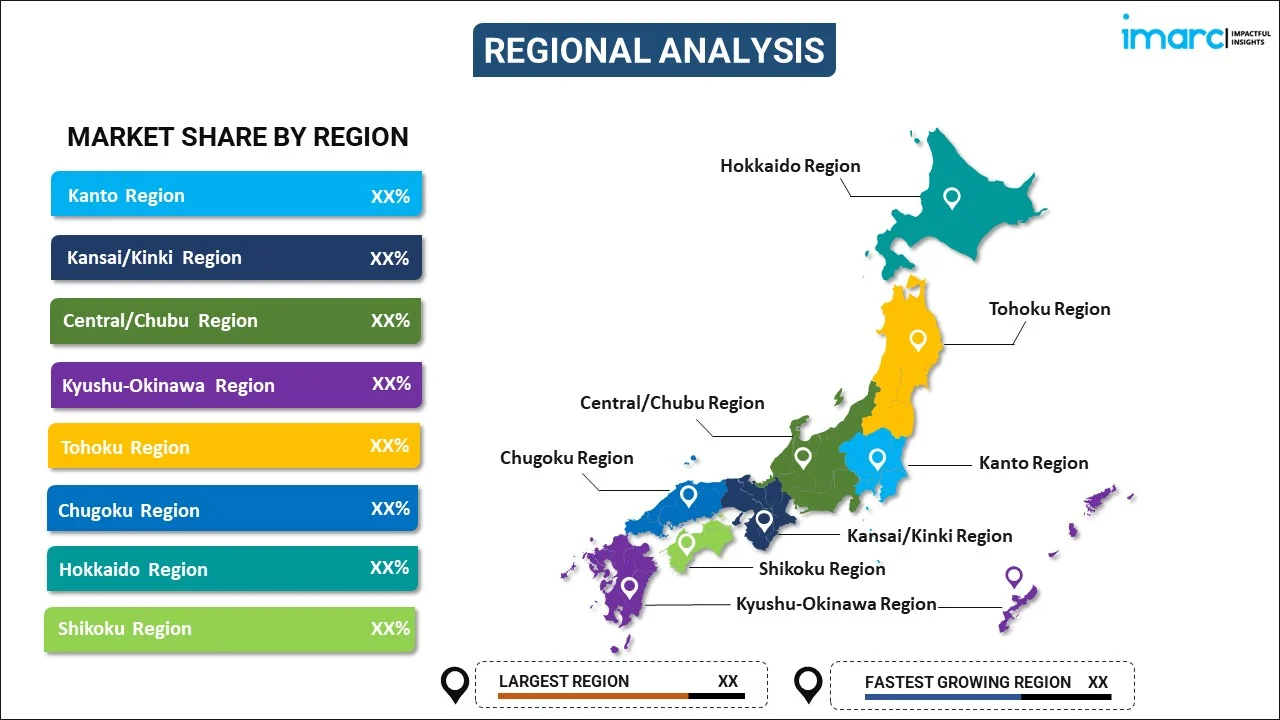
Japan Full-Service Carrier Market Report by Service (Meals, Beverages, In Flight Entertainment, and Others), Application (International Aviation, Domestic Aviation), and Region 2026-2034
Market Overview:
Japan full-service carrier market size reached USD 16.6 Billion in 2025. Looking forward, IMARC Group expects the market to reach USD 25.1 Billion by 2034, exhibiting a growth rate (CAGR) of 4.70% during 2026-2034. The growing demand for personalized and seamless passenger experiences, the increasing traveling activities among the masses to explore new destinations, and rising awareness of environmental issues and the carbon footprint of air travel represent some of the key factors driving the market.
|
Report Attribute
|
Key Statistics
|
|---|---|
|
Base Year
|
2025
|
|
Forecast Years
|
2026-2034
|
|
Historical Years
|
2020-2025
|
| Market Size in 2025 | USD 16.6 Billion |
| Market Forecast in 2034 | USD 25.1 Billion |
| Market Growth Rate 2026-2034 | 4.70% |
Access the full market insights report Request Sample
Full-service carrier (FSC) refers to airlines that provide a wide range of services to passengers, often including amenities, such as meals, entertainment, and checked baggage as a part of the ticket price. It comprises flag carriers, which are often government-owned or designated as the national airline of a particular country. It consists of legacy carriers, which often have a strong presence and are known for their reliability and comprehensive services. It also includes hybrid carriers, which blur the lines between flag carriers and legacy carriers, offering a mix of services to cater to a broader range of passengers. It enables passengers to enjoy a more comfortable and convenient journey with amenities, such as spacious seating, in-flight entertainment, and complimentary meals. It often includes checked baggage as part of the ticket price, providing added convenience for travelers with luggage. It typically offers a range of ticket options, including business class and premium economy, allowing passengers to customize their travel experience based on their preferences and budget. It is synonymous with a higher quality of service, attracting passengers who prioritize comfort and additional amenities. It generates substantial revenue and employment opportunities, contributing to the economic growth of the airline industry.
Japan Full-Service Carrier Market Trends:
At present, the increasing demand for personalized and seamless passenger experiences as travelers are becoming more discerning, seeking convenience, comfort, and a holistic travel experience represents one of the crucial factors impelling the growth of the market in Japan. Besides this, the rising availability of advanced booking systems, in-flight entertainment, and enhanced cabin services to elevate the overall journey is contributing to the market growth. In addition to this, the growing awareness of environmental issues and the carbon footprint of air travel are encouraging passengers to favor airlines that demonstrate a commitment to sustainability. This trend is also compelling FSCs to explore and invest in eco-friendly initiatives, such as fuel-efficient aircraft, carbon offset programs, and sustainable operational practices, thereby aligning their services with sustainable values. This, in turn, is acting as a major growth-inducing factor. Apart from this, the increasing integration of cutting-edge technologies, including artificial intelligence (AI), data analytics, and mobile applications, is allowing FSCs to optimize their operations, streamline processes, and enhance the overall passenger experience. Additionally, FSCs are adapting their business models to incorporate elements of cost efficiency while maintaining the premium services that distinguish them from their low-cost counterparts. Moreover, the rising codeshare agreements and partnerships between travel technology companies and key market players to provide passengers with a more comprehensive travel experience are bolstering the market growth. Furthermore, the increasing traveling activities among the masses to explore new destinations is strengthening the market growth in the country.
Japan Full-Service Carrier Market Segmentation:
IMARC Group provides an analysis of the key trends in each segment of the market, along with forecasts at the country level for 2026-2034. Our report has categorized the market based on service and application.
Service Insights:

To get detailed segment analysis of this market Request Sample
- Meals
- Beverages
- In Flight Entertainment
- Others
The report has provided a detailed breakup and analysis of the market based on the service. This includes meals, beverages, in flight entertainment, and others.
Application Insights:
- International Aviation
- Domestic Aviation
A detailed breakup and analysis of the market based on the application have also been provided in the report. This includes international aviation and domestic aviation.
Regional Insights:

To get detailed regional analysis of this market Request Sample
- Kanto Region
- Kansai/Kinki Region
- Central/ Chubu Region
- Kyushu-Okinawa Region
- Tohoku Region
- Chugoku Region
- Hokkaido Region
- Shikoku Region
The report has also provided a comprehensive analysis of all the major regional markets, which include Kanto Region, Kansai/Kinki Region, Central/ Chubu Region, Kyushu-Okinawa Region, Tohoku Region, Chugoku Region, Hokkaido Region, and Shikoku Region.
Competitive Landscape:
The market research report has also provided a comprehensive analysis of the competitive landscape. Competitive analysis such as market structure, key player positioning, top winning strategies, competitive dashboard, and company evaluation quadrant has been covered in the report. Also, detailed profiles of all major companies have been provided.
Japan Full-Service Carrier Market Report Coverage:
| Report Features | Details |
|---|---|
| Base Year of the Analysis | 2025 |
| Historical Period | 2020-2025 |
| Forecast Period | 2026-2034 |
| Units | Billion USD |
| Scope of the Report | Exploration of Historical and Forecast Trends, Industry Catalysts and Challenges, Segment-Wise Historical and Predictive Market Assessment:
|
| Services Covered | Meals, Beverages, In Flight Entertainment, Others |
| Applications Covered | International Aviation, Domestic Aviation |
| Regions Covered | Kanto Region, Kansai/Kinki Region, Central/ Chubu Region, Kyushu-Okinawa Region, Tohoku Region, Chugoku Region, Hokkaido Region, Shikoku Region |
| Customization Scope | 10% Free Customization |
| Post-Sale Analyst Support | 10-12 Weeks |
| Delivery Format | PDF and Excel through Email (We can also provide the editable version of the report in PPT/Word format on special request) |
Key Questions Answered in This Report:
- How has the Japan full-service carrier market performed so far and how will it perform in the coming years?
- What has been the impact of COVID-19 on the Japan full-service carrier market?
- What is the breakup of the Japan full-service carrier market on the basis of service?
- What is the breakup of the Japan full-service carrier market on the basis of application?
- What are the various stages in the value chain of the Japan full-service carrier market?
- What are the key driving factors and challenges in the Japan full-service carrier?
- What is the structure of the Japan full-service carrier market and who are the key players?
- What is the degree of competition in the Japan full-service carrier market?
Key Benefits for Stakeholders:
- IMARC’s industry report offers a comprehensive quantitative analysis of various market segments, historical and current market trends, market forecasts, and dynamics of the Japan full-service carrier market from 2020-2034.
- The research report provides the latest information on the market drivers, challenges, and opportunities in the Japan full-service carrier market.
- Porter's five forces analysis assist stakeholders in assessing the impact of new entrants, competitive rivalry, supplier power, buyer power, and the threat of substitution. It helps stakeholders to analyze the level of competition within the Japan full-service carrier industry and its attractiveness.
- Competitive landscape allows stakeholders to understand their competitive environment and provides an insight into the current positions of key players in the market.
Need more help?
- Speak to our experienced analysts for insights on the current market scenarios.
- Include additional segments and countries to customize the report as per your requirement.
- Gain an unparalleled competitive advantage in your domain by understanding how to utilize the report and positively impacting your operations and revenue.
- For further assistance, please connect with our analysts.
 Request Customization
Request Customization
 Speak to an Analyst
Speak to an Analyst
 Request Brochure
Request Brochure
 Inquire Before Buying
Inquire Before Buying




.webp)




.webp)












